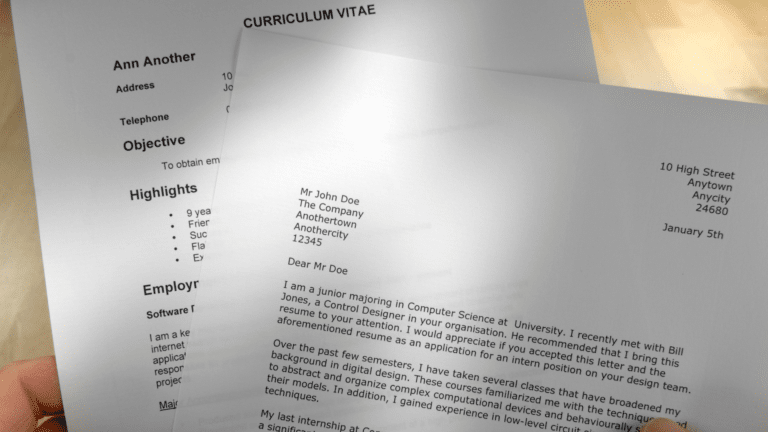No matter how many interviews you’ve had so far, it’s improbable that you’ll feel ready until you’ve done everything you can to prepare for it. While the interviews for many jobs can look very similar, teacher interview questions tend to be very specific.
So, what should you expect, and where should you look for inspiration?
If you have an interview for a teaching job lined up, you’re in luck. This article offers you 13 teacher interview questions, sample answers, and expert tips on how to land that teaching job successfully.
Let’s get right into it!
Key Takeaways
- The main things employers look for in candidates who apply for teaching positions are classroom and time management skills, teacher-student communication skills, digital literacy, and resilience.
- Avoid mentioning that you’re strict and discipline your students with punishment. Instead, assert authority based on respect and trust.
- Teaching should be student-centered, and minimal time should be spent on the educator.
- The best tips for nailing the interview are researching the school, dressing properly, and preparing questions for the interviewer.
What Employers Look for In Teachers
Teaching is not easy, no matter what they tell you. Other than having excellent interpersonal skills that will help you deal with students, as a teacher, you need to gain a plethora of different skills and qualifications that recruiters expect from you. Here are the core ones.
- Classroom and time management skills. You need to have complete control over everything that’s going on in your classroom. Are the teaching aids ready? Is everyone on their best behavior and committed to learning? Those are only some of your responsibilities.
You also need to have a perfect sense of the timeline of your class.
If the bell rings and you’re only halfway through your lesson, you should put more work into your time management skills. For this reason, schools might ask you to prepare a demo class even before the interview. It will perfectly display how well you manage the classroom and the time at your disposal.
- Resilience. You need to be psychologically apt and have strong mechanisms to handle stress. Teaching is highly dynamic, and you’re unlikely to last long if you don’t have thick skin.
- Teacher-student communication skills. Communication skills extend far beyond your ability to pass on the knowledge to those across the big table. You need superb active listening skills that help you put yourself in students’ shoes, identify their learning and other needs, and act accordingly.
- Digital literacy. Lastly, it’s 2024, and technological advancement has enriched the learning experience by a great deal. If you want to keep up, you should be proficient in all the tools and software required for teaching.
13 Teacher Interview Sample Questions & Answers
After your teaching degree, it’s time to delve into the waters of the noble calling of sharing your knowledge.
However, even if you’re looking for a new job and already have teaching experience, interview questions for teachers can easily catch you off-guard. Here, we’ll offer 13 relevant teacher interview questions and sample answers so that you can practice and prepare for your interview properly.
#1. Why do you want to become a teacher?
Interviewers who ask this question want a peek at your career goals so that they can assess whether your values fit into those of the school they’re representing. They also like to see what motivates you the most.
Sample answer: I used to babysit a child who was underperforming in every subject, and a contributing factor was the fact he stuttered, so he was shy.
One evening, I suggested we start reading The Little Prince. To my amazement, he was utterly impressed by it. Months later, he started reading regularly and taking English tests.
From that moment on, I knew I had found my calling. I knew I had the patience and talent to approach children and to pass on my knowledge in the most subtle of ways.
To this day, I never once regretted my choice because if I could help that one child, I can probably help many others.
Why it works: With this answer, you can impress recruiters by showing them what you’re passionate about. The great thing is that you’re offering your own original example that can potentially leave a memorable impression. They may see that you’re in it for all the right reasons and don’t plan to leave the field, as you have a clear goal and a mission.
#2. How do you handle difficult students?
In essence, this teacher interview question about student behavior lets the interviewer know if you have what it takes to manage a student or a group who could disrupt your class. Those teachers who can’t assert their authority have difficulty keeping up, so the recruiters want to rule those professionals out.
Sample answer: I don’t believe in punishment. The strategy that I adopted from my favorite professor was to show authority through kindness, helpfulness, and trust. Respect will follow if I approach each student equally and try to be supportive in other ways.
During my previous job, a student told me in the hallway that they stopped being disruptive because they felt it was unfair to disrespect the teacher, who goes above and beyond to meet students’ needs. That’s my foolproof method.
Why it works: Your interviewer has heard all the standard protocol examples for handling your difficult students. By offering something original yet highly effective, you’ll stand out in the pool of candidates who repeat much of the same story.
#3. How do you keep your students engaged?
This is one of the teacher interview questions that is paramount to discovering how successful you’ll be at the job. After all, students who are not involved are unlikely to learn much. Moreover, the interviewers want a closer look into your teaching skills, and this question helps them get it.
Sample answer: One of my main strategies is to focus on what’s relevant for the students. If the example of something is a story revolving around classical composers, and I think most of my students don’t find the subject interesting, I’ll switch it up.
I’ll develop examples centered around their interests and draw them into the subject with something they enjoy in their spare time. This method is particularly effective when dealing with complex topics.
Why it works: You’re showing your adaptability and a teaching philosophy that aims to make the students like what they need to learn. It paints a picture of a professional willing to go above and beyond to accommodate students’ needs.
#4. How do you communicate with parents?
Part of your job as a teacher can involve regular communication with the parents or guardians of students. By asking this question, recruiters assess your communication skills outside the classroom and how you deliver feedback.
Sample answer: I believe students receive great help from parents, too. I try to include parents and guardians and offer accurate feedback so they’ll know where their child is in the learning process and what needs improvement. I use professional language, but I’m also kind and compassionate.
I set straight boundaries, but I always offer my contact details for parents to contact if they need school-related help.
Why it works: If you go with this one, you’ll exhibit your communication skills while also revealing your admirable proactivity by offering your contact details to the student’s parents or guardians.
#5. What is your style of teaching?
Your teaching style or philosophy needs to align perfectly with the model the school prefers. The recruiters want to see if your style matches their expectations or if you could add some extra value.
Sample answer: The immersive student-centered approach is the best way to describe my teaching style. I tend to avoid working only with the gifted ones—everyone should have an equal chance, so I dedicate some time to each individual in the classroom.
Meanwhile, I try not to spend much time on myself. The learning progress of each student should be the focus of the educator.
Why it works: This response radiates dedication and professionalism as you show you’ve already developed a proven plan. The student-centered learning approach is widely applauded in teaching, and most schools prefer it.
#6. Describe a challenging situation in the classroom and how you handled it.
Here, the recruiter wants to see how well-thought-out your course of action is when things are unplanned. Use the answer below to handle this teacher interview question about behavior management.
Sample answer: I taught a class in which a group of 3 students had a personal dispute with another group of four, and they didn’t talk. This situation became a big challenge whenever we had to do group projects. So, one day, I asked them to stay after the class.
I explained that I didn’t want to involve parents because I believed there were ways to settle this more easily. After I somehow got them to talk, we all discussed the issue at hand, and it turned out it wasn’t that unsurmountable. Then, I left the classroom and let them talk.
The next day, they came and said they sorted everything, and we never had issues with group assignments.
Why it works: When you mentioned that you wouldn’t involve parents, the students realized you could have quickly done that, so they chose the easier path.
Moreover, you approached them as friends, and it was easier for them to communicate the matter with me because of the trust we’ve built for years. Ultimately, you let them talk among themselves to discuss all the personal bits so you can set clear boundaries.
#7. What technology do you use in the classroom?
With teacher interview questions like this one, the recruiters want to see how digitally proficient you are. No matter how old school you tend to be and how much you rely on classic, proven methods, you need to keep up with the modern age.
Sample answer: I’ve used various tech tools during my years of teaching, and they mainly include virtual teaching aids. Apart from Google Forms for anonymous surveys, I also use Google Classroom for better implementation of distributing and grading the assignments.
Other than that, there are several tools the current school I work for has developed, and I’ve been using them to make quizzes and carry out teaching games.
Why it works: You’re mentioning tools designed to facilitate specific tasks you must complete during your class. With this example, you show that you’re relying on technology for administrative work and ensuring your teaching is of better quality. Besides, it shows you as a highly competitive candidate because you’re up to date with recent technological developments.
#8. How do you feel about online teaching?
Besides assessing your digital proficiency, the recruiters want to see how versatile you are and how available you’d be when there aren’t enough conditions for traditional classes.
Sample answer: COVID-19 spared no one, especially students and teachers. We had to switch to online teaching during my previous jobs, and I must say I had no problems with it. I enjoyed the experience as much as I did in a physical classroom. If necessary, I think I’d do an excellent job teaching online, as much as I teach in a physical classroom.
Why it works: You’re simply showing that another working model is no obstacle for you and that you’re ready to accommodate changes such as this if circumstances arise. With this answer, you show that you already have experience with online teaching and excel at it.
#9. What methods do you use to evaluate student performance?
This question examines the standard you use to evaluate and later improve students’ efforts. This is one of those points where recruiters want to see if your practices align with theirs.
Sample answer: I rely on a standard evaluation form comprising two methods for measuring student learning. The first is a summative assessment. It combines quizzes, tests, and other activities that evaluate student performance.
The second method is a formative one, and it is the traditional means of assessing student performance both from their classroom assignments and their papers and then providing feedback in a written or oral form.
Why it works: You’ll want to mention standardized methods because you’ll present yourself as a knowledgeable and experienced professional who uses specific, industry-related methods other than just talking about evaluation in general.
#10. How would you describe the term ‘equal opportunity’ in terms of teaching?
Equal opportunity is necessary for any reputable educational institution, so you’ll have to show on what level you’re familiar with the matter and your stance on implementing this policy. Here’s how to answer this teacher interview question about diversity and equal opportunity.
Sample answer: I see equal opportunity as every student’s right to participate in education, regardless of disability, minority status on any level, or the difficulties they face. Curricula must be changed if they are not designed to cover each student’s needs.
There has to be a systematic order in which all schools must comply and meet the requirements to make education possible for everyone who wants and needs to learn.
Why it works: It works because you display an unwavering commitment to making each student’s right to a premium education possible. With this answer, you leave room for no compromise regarding equal chances for everyone who wants an education.
#11. Tell us more about the teacher’s responsibility in keeping students safe.
This is a teacher interview question on safeguarding, and it examines your opinion on what you are and aren’t responsible for when it comes to student safety at school.
Sample answer: Everything that happens in the classroom is the teacher’s responsibility. This involves their emotional and physical safety at all times while they’re attending classes. I consider it my first and foremost responsibility to keep students feeling welcome, content, and safe in every sense of the word while they’re under my care.
Why it works: You are firmly stating that everything that happens during your teaching is your own responsibility and that you’ll do everything you can to keep the students safe. However, it is not your job to take care of them once they’re in the hallways or in the schoolyard.
That is the school’s responsibility, and it must be granted at all costs.
#12. What makes you a perfect fit for our school?
Essentially, this is a job-specific version of the question “Why should we hire you?” and by asking it, the recruiter wants to see what assets you bring to the table and what your unique value is.
Sample answer: My years of experience, coupled with contemporary approaches to teaching, would make an excellent fit for your school. Moreover, while researching your institution, I noticed you seek more staff for your special education department.
Since I have completed all courses in this field, I think I could contribute much to making your school even more reputable and accessible to everyone.
Why it works: One of the main reasons to go with this is because you make it specific. Aside from stating you’re responsible, diligent, and hardworking, you come with particular expertise you can offer. Finally, they may see how well you researched the school and how your presence would improve it.
#13. Do you have any questions for us?
When you get to the part where they ask you, “Do you have any questions for us?” consider that the interview is coming to a close. With this one, your research skills and priorities are on the front line, as your answers will reflect what you find most important about the position.
Sample answer:
- “What are the growth opportunities for teachers in your school?”
- “What do you think is the number one priority in terms of teaching for the school?”
- “What are your future plans for the school?”
Why it works: You ask an essential question about teacher growth opportunities, which means you care for your career advancement while highlighting your ambition.
With the second question, you inspect the school’s primary goal, which hints that you already have set rules and want to know if their priority fits into those. Finally, the question about plans reveals both your interest in the school’s development and whether there’s room for you to participate in it.
Expert Tips on How to Nail Your Teacher Interview
Once the recruiting team has seen your qualifications and assessed your potential demo class and cover letter, you need to prepare for the most vital part of the hiring process—the interview. The impression you’ll leave means the world, so we’ll help you with some helpful interview tips before you head there with hopes of landing your dream job.
- Research the institution. This goes without saying, especially if you don’t know anyone who works there. While researching their core values, you’re hunting for helpful information that could come up as questions at the interview.
Additionally, you want to ensure that this school is right for you. You may find concerning information during your research, so it’s pointless to continue if your values don’t align with theirs.
- Prepare your questions. If you don’t have a chance to attend the informational interview where you can ask questions, you’ll be able to do so at the end of your job interview.
Choose your questions wisely and go for those that will help you squeeze out the most valuable information about the job and the company.
- Dress to impress. Your business attire must be suitable for the teaching job, and if you’re not sure, check if there is an interview dress code. Equally important, pay attention to your posture and the way you carry yourself. You need to radiate confidence and professional authority.
Final Thoughts
Now that we have armed you with 13 questions and thorough sample answers for each one, you can confidently walk into that interview room and claim your next teaching job. Go through each one carefully and adjust them to your individual experience.
Moreover, see what skills the interviewers typically look for in candidates for teaching jobs, and check out the tips we listed at the end.
All in all, this article is a great cheat sheet for a successful interview, so make the most of it.
Good luck!











